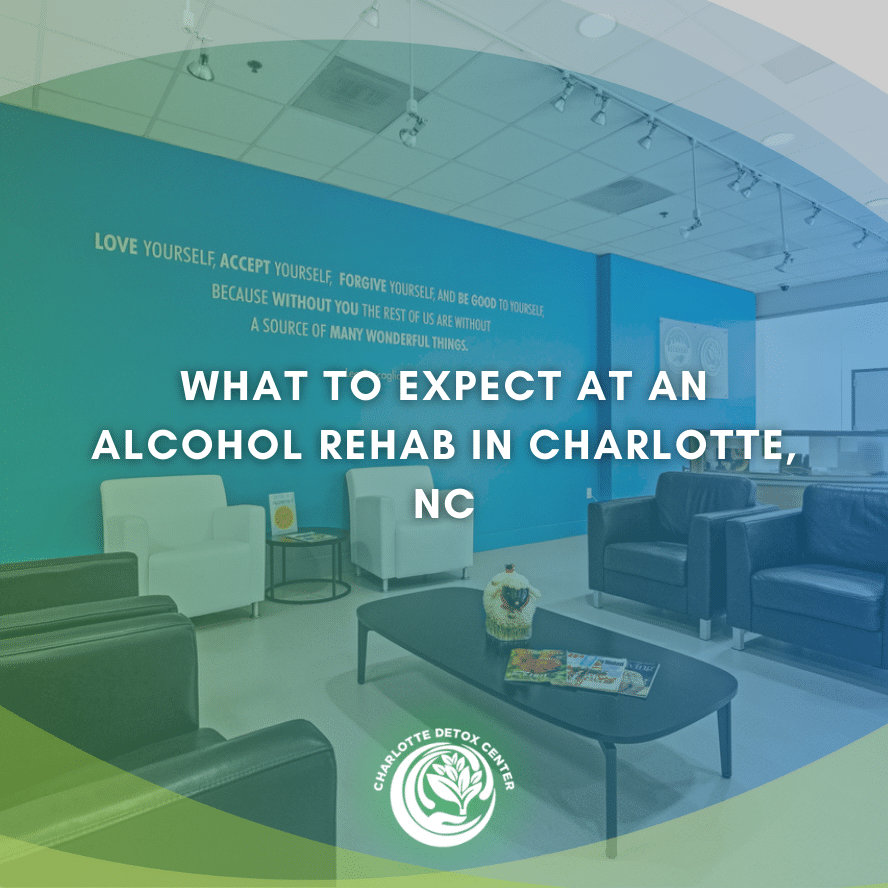What to Expect at an Alcohol Rehab in Charlotte, NC

Medically Verified: 2/1/24
Medical Reviewer
Chief Editor

All of the information on this page has been reviewed and verified by a certified addiction professional.
Alcoholism is a serious problem in the United States, with nearly 30 million people suffering from the condition in 2021.[1] Alcohol use disorder is a serious condition that can impact your ability to function in your daily life, increase your mental health issues, and put you at risk of various physical health complications.
The best way to recover from alcohol addiction is to attend an alcohol rehab program in Charlotte, North Carolina. These programs can provide you with all of the support and treatment you need to maintain long-term sobriety and regain control over your life.
Services Provided During Alcohol Rehab in Charlotte, North Carolina
The goal of alcohol rehab in Charlotte, NC is to provide you with the tools necessary to overcome your substance use disorder. This is achieved through a combination of evidence-based services.
During an alcoholism treatment program, you can expect the following:
Medical Detox
The first step in treating an alcohol use disorder is always medical detox. When you are addicted to alcohol, your body becomes accustomed to the presence of the substance. If you suddenly stop drinking alcohol, you will experience symptoms of withdrawal.
Alcohol withdrawal symptoms can become life-threatening without proper treatment. This is why medical detox services are so important. During alcohol detox, you will be provided with medications and treatments to soothe your symptoms and help your body adjust while the alcohol leaves your system.
Individualized Treatment Planning
Once you complete medical detox, you will begin focusing on the emotional and behavioral aspects of alcoholism recovery. However, your treatment specialists must create a treatment plan for you that is tailored to your specific needs.
To create an individualized treatment plan, your doctors and other staff members will ask you a series of questions to gather pertinent information about you, your health, and your alcohol abuse history.
Examples of questions you might be asked include:
- How long have you been abusing alcohol?
- How frequently do you drink?
- How much alcohol do you drink at once?
- Do you abuse any other substances?
- Do you have any co-occurring mental health conditions?
- What is your family history with addiction and mental health?
- Have you ever been to rehab before?
Your answers to these questions will allow the medical team to create an individualized treatment plan that is specific to your unique needs, allowing you to get the most out of your time at the treatment facility.
Evidence-Based Behavioral Therapy
Once your treatment plan is created, you will begin attending therapy sessions. The types of therapy you engage in will depend on your specific needs. If you have any co-occurring mental health conditions, you will receive therapy targeted to help you manage your addiction and psychiatric disorder at the same time.
It is important to note that the therapy you participate in is evidence-based. This means that the types of therapy alcohol rehab programs in Charlotte, North Carolina use are proven to be effective in treating substance use disorders.
Examples of evidence-based therapies for addiction include:
- Cognitive behavioral therapy (CBT)
- Motivational interviewing (MI)
- Contingency management (CM)
- 12-step facilitation therapy
- Family behavior therapy
- The matrix model
You will attend individual therapy as well as group counseling. Individual therapy is designed to allow you to open up about things you might not feel comfortable sharing in front of others while providing you with one-on-one time with a therapist. Group counseling can allow you to hear other perspectives, gain support from your peers, and develop important social skills.
Aftercare Planning
The last step in alcohol rehab is aftercare planning. Because the addiction relapse rate is between 40 to 60%, this is a vital aspect of recovery.[2] Aftercare planning provides you with the tools and services you need to maintain long-term sobriety outside of the safety of a treatment facility.
Examples of what’s included in an aftercare plan include:
- A list of triggers and coping mechanisms to use
- Continued attendance at therapy
- Continued medication management if needed
- Access to alumni support groups
- Vocational training
- Legal assistance
- Referrals to outpatient treatment or sober living homes
- Recommendations on local alcoholism support groups like Alcoholics Anonymous
Find an Alcohol Rehab Center in Charlotte, North Carolina Today
If you or a loved one struggles with alcoholism, help is available. Alcohol use disorders can wreak havoc on your life, however, professional treatment can help you regain control. With a combination of medical detox, behavioral therapy, and aftercare planning, you can learn to maintain long-term sobriety.
To learn more about our alcohol rehab program in Charlotte, contact Charlotte Detox Center today.
References:
- National Institute of Alcohol Abuse and Alcoholism (NIAAA): Alcohol Use Disorder (AUD) in the United States: Age Groups and Demographic Characteristics, Retrieved May 2023 From https://www.niaaa.nih.gov/alcohols-effects-health/alcohol-topics/alcohol-facts-and-statistics/alcohol-use-disorder-aud-united-states-age-groups-and-demographic-characteristics
- National Institute of Drug Abuse (NIDA): The Science of Addiction Treatment and Recovery, Retrieved May 2023 From https://nida.nih.gov/publications/drugs-brains-behavior-science-addiction/treatment-recovery
